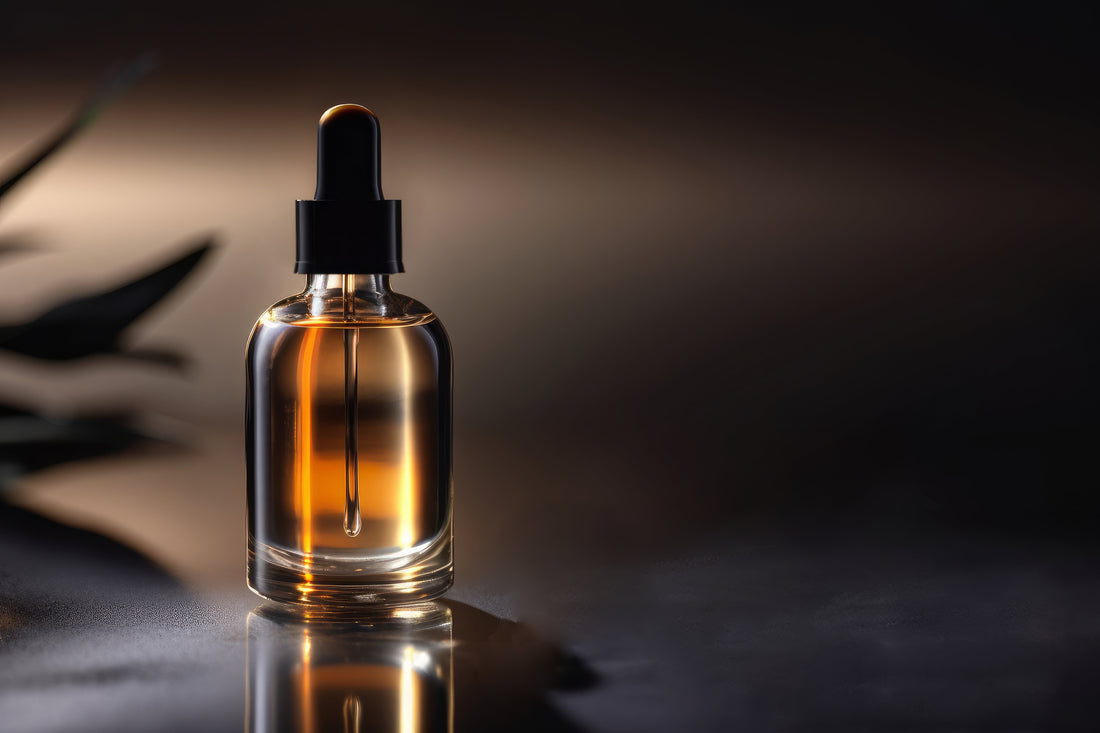
Niacinamide in Skincare: Benefits and How to Use It
Share
Niacinamide in Skincare: Why and How It's Used for Glowing, Healthy Skin
When it comes to skincare ingredients that have become highly recommended for all skin types, niacinamide stands out as one of the most popular and versatile. Whether you're looking to minimize fine lines, improve skin tone, or soothe irritation, niacinamide can work wonders for your complexion. In fact, this powerhouse ingredient has earned its reputation as one of the most beneficial active ingredients available in modern skincare products. But what exactly is niacinamide, and how can you incorporate it into your skincare routine for the best results? This blog will explore everything you need to know about niacinamide: from its benefits and uses to how it's formulated and why it's so effective.
Niacinamide, also known as Vitamin B3, is a water-soluble vitamin found in various foods like meat, fish, and green leafy vegetables, and it’s been a staple in skincare for years. When applied topically, niacinamide has the ability to address a broad range of skin concerns. Whether you're dealing with acne, dark spots, dryness, or uneven texture, niacinamide can provide the necessary support your skin needs to maintain a healthy, glowing appearance. This gentle yet powerful ingredient works by improving your skin’s barrier function, increasing hydration, and offering antioxidant protection. By understanding why and how niacinamide works, you’ll be able to unlock its potential for radiant skin.
What is Niacinamide?
Niacinamide, or nicotinamide, is a form of Vitamin B3. It is a naturally occurring substance in the body that plays an essential role in the function and health of your skin. In skincare, niacinamide works primarily to support your skin’s barrier, improve moisture retention, reduce inflammation, and even out skin tone. It also supports the production of ceramides, which are lipid molecules crucial for maintaining a strong, healthy skin barrier.
As a skincare ingredient, niacinamide has a long history of being used to treat conditions like acne, rosacea, and pigmentation issues. It has a light texture and is typically well-tolerated by most skin types, including sensitive skin. What makes niacinamide such an appealing ingredient is its versatility—no matter your skin type or skin concern, it can likely provide visible improvements over time.
How Niacinamide Works in Skincare
When niacinamide is applied topically, it works by penetrating the skin's surface to reach the lower layers where it has the most impact. Once absorbed, niacinamide starts working on a cellular level, impacting multiple functions and processes that contribute to skin health. Let’s take a closer look at the key ways niacinamide improves the skin:
-
Strengthening the Skin Barrier: One of the most important functions of niacinamide is its ability to support the skin’s natural barrier. The skin barrier is your first line of defense against environmental stressors, pollutants, bacteria, and moisture loss. Niacinamide helps strengthen this barrier by promoting the production of ceramides, lipids that form part of the skin's protective layer. By improving the barrier, niacinamide can help prevent transepidermal water loss (TEWL), which leads to dry, irritated skin. As a result, skin becomes more resilient, hydrated, and balanced.
-
Regulating Oil Production: Niacinamide has been shown to help regulate sebum (oil) production, making it a popular choice for those with oily or acne-prone skin. By controlling excess oil, it can help reduce the likelihood of clogged pores, which is a leading cause of acne breakouts. Niacinamide can make oily skin feel more balanced without stripping it of moisture, ensuring that the skin remains neither too dry nor too oily.
-
Reducing Inflammation: Niacinamide possesses anti-inflammatory properties, which make it an excellent choice for individuals with sensitive, irritated, or inflamed skin. It can help soothe redness and irritation caused by conditions like acne, rosacea, or eczema. Additionally, niacinamide has been shown to calm skin conditions that cause chronic inflammation, leading to a more even and balanced complexion. It can even reduce the redness associated with sunburn, providing soothing relief to the skin.
-
Minimizing Fine Lines and Wrinkles: Niacinamide has been found to stimulate collagen and elastin production, both of which are vital for maintaining skin’s firmness and elasticity. As a result, niacinamide can help minimize the appearance of fine lines and wrinkles over time. By improving the skin’s structure and helping to smooth out its texture, niacinamide leaves the skin looking plumper and more youthful.
-
Brightening Skin Tone: One of the most well-known benefits of niacinamide is its ability to brighten the complexion and even out skin tone. It works by inhibiting the transfer of melanin (the pigment responsible for dark spots) to the surface of the skin. This makes niacinamide effective for fading dark spots, hyperpigmentation, and post-acne scars, revealing a more radiant, even-toned complexion. It also helps reduce the appearance of age spots and sun spots, making it an excellent choice for mature skin.
-
Fighting Free Radicals: Niacinamide is an antioxidant, which means it helps protect the skin from free radicals, unstable molecules that can cause oxidative damage and accelerate the aging process. Free radicals are generated by environmental stressors like pollution, UV rays, and smoking. By neutralizing these free radicals, niacinamide helps prevent premature aging, allowing your skin to look younger and more vibrant.
The Benefits of Niacinamide in Skincare
Explore Skincare on AgelessBeauty3000.com
Niacinamide offers a variety of benefits for your skin, making it a must-have ingredient for many skincare routines. Let’s break down some of its most notable advantages:
-
Improved Skin Texture: As niacinamide helps boost collagen production, it can also help improve the overall texture of your skin. The result is smoother, softer skin that looks and feels more refined. It can be particularly beneficial for those who have rough, uneven skin texture due to acne scars or sun damage.
-
Hydration and Moisture Retention: Niacinamide’s ability to strengthen the skin barrier helps keep moisture in the skin. This is particularly helpful for people with dry skin or compromised skin barriers. With regular use, niacinamide can help the skin retain moisture more effectively, making it feel hydrated and plump throughout the day.
-
Minimized Pore Size: Niacinamide has been shown to reduce the appearance of enlarged pores. By regulating oil production and improving skin texture, niacinamide helps create a smoother surface, which can make pores appear smaller and less noticeable. This is great for individuals with oily or combination skin, as it can contribute to a more refined, poreless appearance.
-
Protection from UV Damage: Although niacinamide is not a replacement for sunscreen, studies suggest that it can provide additional protection from the harmful effects of UV exposure. Niacinamide has been shown to reduce the skin’s sensitivity to UV-induced inflammation and even protect the skin from some of the damage caused by sun exposure. This makes it an ideal ingredient to use in conjunction with sunscreen.
-
Gentle and Well-Tolerated: Niacinamide is one of the gentlest active ingredients available in skincare, making it suitable for all skin types, including sensitive skin. It can be used daily without the irritation that other actives like retinoids or alpha hydroxy acids (AHAs) may cause. People with conditions like rosacea, eczema, and psoriasis often find relief from their symptoms by using niacinamide in their routines.
How to Use Niacinamide in Your Skincare Routine
Integrating niacinamide into your skincare routine is simple, thanks to its versatility. Here’s a step-by-step guide to help you get the most out of niacinamide:
-
Cleanse Your Skin: Start by cleansing your face with a gentle cleanser that suits your skin type. Cleansing helps remove dirt, oil, and makeup, ensuring that niacinamide can penetrate deeply and work effectively.
-
Apply Toner (Optional): If you use a toner, apply it after cleansing. Toners help balance the skin’s pH levels and prepare your skin to absorb the active ingredients in your serum or moisturizer.
-
Use a Niacinamide Serum: Niacinamide is typically found in serum formulations, which are lightweight and fast-absorbing. Apply a few drops of the niacinamide serum to your fingertips and gently press it into your face. Focus on areas of concern, such as areas with redness, pigmentation, or fine lines.
-
Moisturize: After applying niacinamide, follow up with a moisturizer to lock in hydration and support your skin’s barrier. Niacinamide can help improve the skin’s ability to retain moisture, but it’s important to seal it in with a good moisturizer for maximum results.
-
Sunscreen (AM Routine): During the daytime, always finish your skincare routine with sunscreen. Niacinamide can help protect the skin from some UV-induced damage, but a dedicated sunscreen will provide the essential protection against harmful rays.
Niacinamide and Other Skincare Ingredients
Niacinamide is incredibly versatile and can be combined with many other ingredients to boost the benefits of your skincare routine. Some popular pairings include:
-
Vitamin C: Niacinamide can be combined with Vitamin C, which is known for its brightening and antioxidant properties. These two ingredients work synergistically to improve the skin tone and protect against environmental damage.
-
Hyaluronic Acid: Hyaluronic acid is a hydrating powerhouse, and when used in conjunction with niacinamide, it can help replenish moisture and promote skin hydration. Niacinamide helps retain moisture in the skin, while hyaluronic acid draws moisture in.
-
Retinoids: Niacinamide can be paired with retinoids (such as retinol) to reduce the irritation that retinoids can sometimes cause. This combination can enhance the anti-aging benefits without causing excessive dryness or sensitivity.
-
Peptides: Peptides and niacinamide work well together in promoting collagen production, leading to firmer, more youthful-looking skin. Together, they can tackle fine lines, wrinkles, and loss of elasticity.
Conclusion
Niacinamide is truly a skincare hero. Whether you're dealing with acne, pigmentation, dryness, or fine lines, this powerful yet gentle ingredient can provide significant benefits. It works by strengthening the skin’s barrier, regulating oil production, reducing inflammation, brightening the complexion, and improving texture—all while being well-tolerated by most skin types. Niacinamide is a versatile ingredient that can be easily incorporated into your skincare routine to promote long-term skin health. By including niacinamide in your routine, you can expect to see smoother, clearer, and more radiant skin with consistent use.
Explore Skincare on AgelessBeauty3000.com
